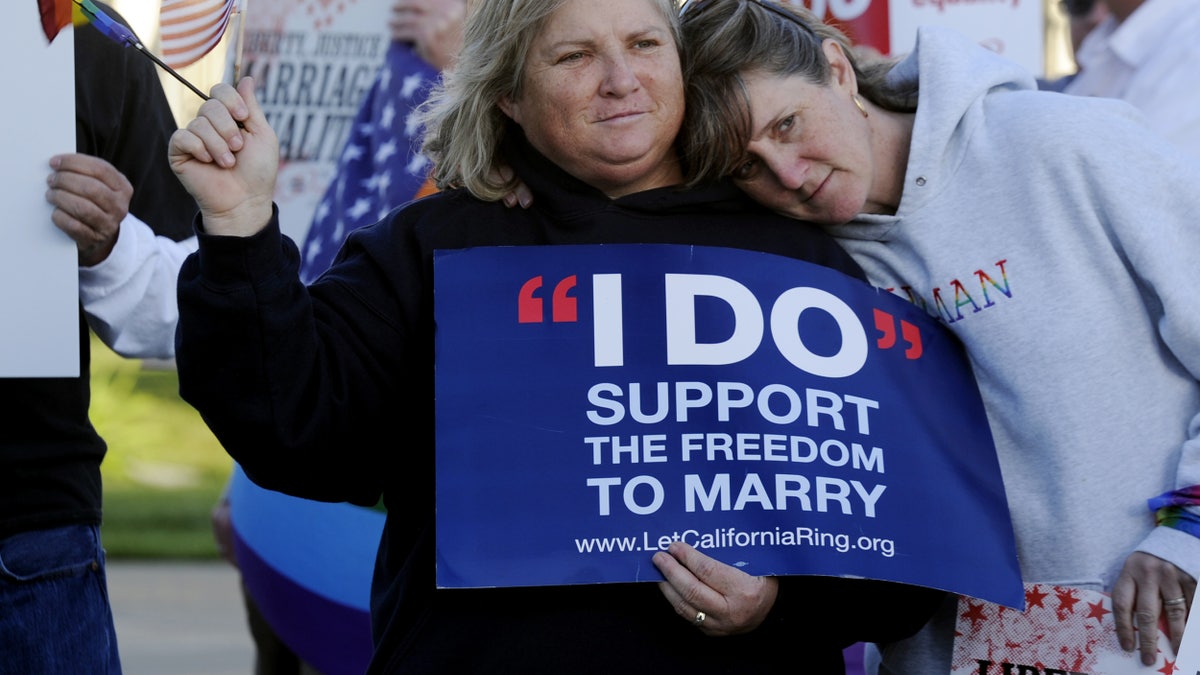
Kim Roberts, left, and her partner Lisa Mayes of Benicia, Calif. participate in a marriage equality rally on Tuesday, March 26, 2013 at the Solano County Government Center in Fairfield before the Supreme Court hears arguments concerning the Defense of Marriage Act after it heard arguments contesting the constitutionality of the California's Proposition 8 on Tuesday. (AP Photo/The Reporter, Joel Rosenbaum)MANDATORY CREDIT
With the Supreme Court now hearing cases centering on the legality of a federal ban on gay marriage and California’s ban on gay marriage, the real way our nation should address marriage rights is to get government out of the marriage business, altogether.
It never made sense to have state or federal government intrude into personal affairs by giving it the power to sanction and legitimize the loving commitment of one individual to another. That is a matter for the adults involved, who should share their intentions and vows in a ceremony with family, friends and any religious institutions they choose (or not), then sign any financial documents they see as being appropriate and, perhaps, exchange rings. End of story.
If two adults are mature enough to get married, they should be mature enough to envision and codify how they will deal with their finances, should that marriage end.
The government’s only interest should be in enforcing child support and fair child custody and visitation for each parent, in the event of a dissolution of the (government-free) marital bond. Making certain that children do not descend into poverty, and spouses are not left without parental rights, would then be the only proper function of the state related to marriage—both triggered only when marriages end. This would be no different than the state’s current role in enforcing child support, custody and visitation in non-married couples.
The legal sanctioning of, or refusal to sanction, any loving union between adults is inherently laden with cultural values. And if it is determined that love and commitment should be the sole driving force behind state and federal marriage laws, then it is utterly and completely illogical to deny five people who love one another the right to marry as a group. Heterosexual government-sanctioned marriage leads logically to homosexual government-sanctioned marriage, which leads logically to polygamy. Anyone who suggests otherwise is suggesting that government should play favorites and show prejudice.
If two men can marry, despite having no biological ability to reproduce (which some argue is the government’s stake in heterosexual marriage) and without having both genders represented as role models in the household (which others argue is the government’s stake in heterosexual marriage), then certainly two men and a woman can marry. No one can credibly argue that three people cannot be in love, and the three-parent structure would offer the children of this marriage a mother and two fathers—role models of both genders, with 50 percent more earning capacity than a two-parent family and many advantages, in terms of built-in child care.
Government should not play favorites or show prejudice. And the proper next step for government to take is a major step out of our personal lives. This can be done by neither showing a preference for or against marriages, nor deciding who should marry whom. Instead, that should be left to people and their loved ones and their religious institutions, if any.
All state, federal and corporate (as in, health insurance) preferences shown married couples, as opposed to those who are not married, are inherently prejudicial. There ought to be no distinction between the rules for filing taxes, whether one is married, or not. Every individual should file taxes under the same set of rules. There ought to be no government rubber stamp via government-sanctioned marriage of whether someone has the right to act on behalf of another individual who is too ill to make decisions. That should all be codified in a prenuptial agreement or other legal documents. There ought to be no automatic inheritance of assets by spouses, which should be codified in a will.
The gay marriage debate is a sideshow in the bigger debate we must have: Why was government so intrusive as to be involved in marriage, in the first place, and shouldn’t government divorce itself from the concept of sanctioning marriage, altogether?




















